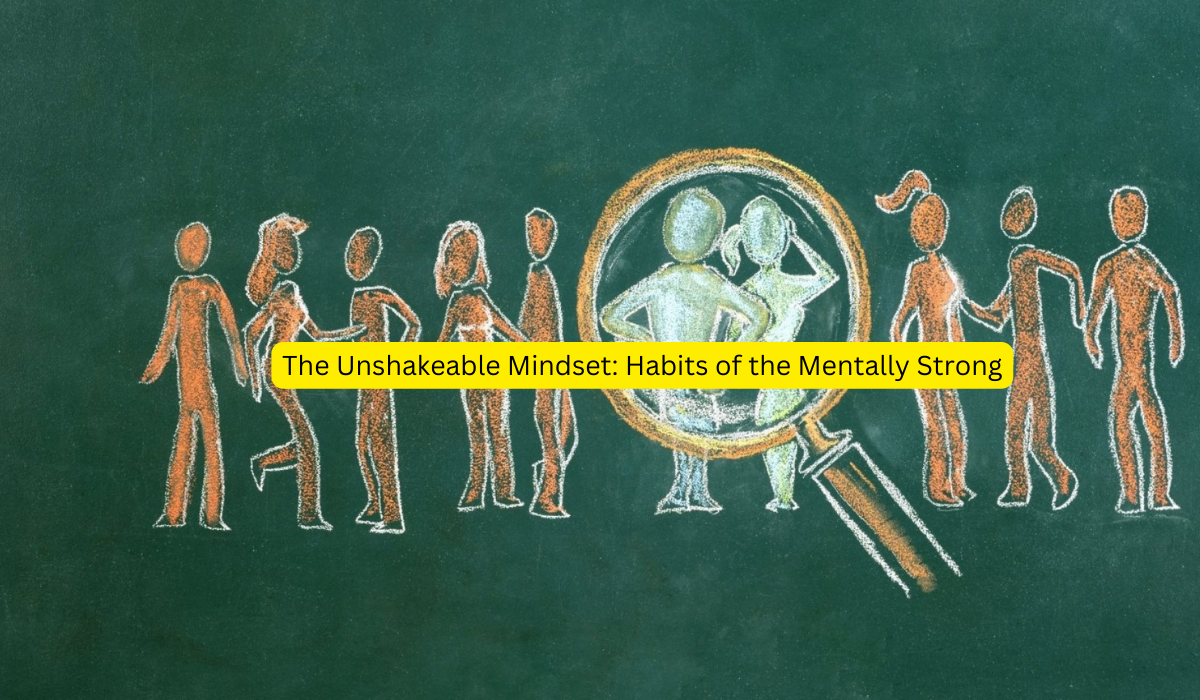Life throws curveballs. We all face challenges, setbacks, and moments that test our resilience. But what separates those who crumble under pressure from those who bounce back stronger? The answer lies in mental strength.
Mental strength isn’t about being superhuman. It’s about cultivating a set of habits and mindsets that empower you to navigate life’s complexities with grace and grit. Let’s explore some of the unique practices that mentally strong people swear by, habits you can incorporate into your own life to build unshakeable resilience.
Facing Reality, Not Fantasy: Embracing Uncomfortable Truths
Ever feel tempted to sugarcoat a difficult situation or bury your head in the sand? Mentally strong people resist these urges. Here’s why:
- Confronting Reality: They understand that ignoring problems only makes them worse. By acknowledging reality, even when it’s uncomfortable, they can develop effective solutions.
- Taking Responsibility: They don’t shy away from taking ownership of their actions and choices. This empowers them to learn from mistakes and move forward.
Imagine your mind as a cluttered room. Ignoring the mess won’t make it disappear. Mentally strong people confront the clutter (uncomfortable truths) to create a clear and organized space (a healthy mindset).
Embrace the Power of “Yet”: Reframing Challenges as Opportunities
Feeling defeated by a setback? Mentally strong people have a powerful reframing tool in their arsenal: the word “yet.”
- The “Yet” Mindset: Instead of viewing challenges as insurmountable obstacles, they see them as temporary hurdles. They believe, “I can’t do this yet,” which fuels their determination to learn and grow.
- Growth Mindset: This “yet” mentality fosters a growth mindset. They believe their abilities can be developed through effort and persistence, not just innate talent.
Think of learning a new skill. At first, you might not be able to do it perfectly. But mentally strong people approach it with the “yet” mindset, knowing they can improve with practice.
Taming the Inner Critic: Cultivating Self-Compassion
We all have that nagging inner voice that whispers doubts and criticisms. Mentally strong people learn to manage this internal chatter.
- Challenging Negative Thoughts: They don’t let negative self-talk run the show. They recognize these thoughts as unhelpful and actively challenge them with more realistic and positive self-affirmations.
- Self-Compassion vs. Self-Pity: They practice self-compassion, offering themselves the same understanding and kindness they would extend to a friend facing a similar challenge. This fosters resilience and emotional well-being.
Imagine your inner critic as a noisy neighbor. You can’t silence them completely, but mentally strong people learn to turn down the volume and focus on more positive voices.
Vulnerability is Strength, Not Weakness: Embracing Emotional Honesty
Bottling up emotions might seem like a way to stay strong, but it can backfire. Here’s why mentally strong people embrace vulnerability:
- Emotional Intelligence: They understand the importance of emotional intelligence. Recognizing and expressing their emotions allows them to navigate relationships more effectively and build genuine connections.
- Seeking Support: They know they don’t have to face challenges alone. They aren’t afraid to reach out for support from friends, family, or professionals when needed.
Imagine emotions like waves. Ignoring them won’t stop them from crashing. Mentally strong people learn to recognize the waves, understand how they impact them, and navigate them effectively.
Investing in Growth: Prioritizing Continuous Learning
The world is constantly changing, and mentally strong people understand the importance of lifelong learning.
- Growth Through Knowledge: They actively seek out new information and experiences. They read, take courses, and engage in activities that challenge them mentally and emotionally.
- Adaptability: This continuous learning fosters adaptability. They can adjust their approach and stay resilient in the face of change.
Think of your mind as a muscle. The more you exercise it, the stronger it becomes. Mentally strong people constantly engage their brain and welcome new challenges to keep it sharp and adaptable.
The Takeaway: Building Your Unshakeable Mindset
Mental strength isn’t a destination; it’s a journey. By incorporating these habits into your life, you can cultivate an unshakeable mindset that empowers you to navigate life’s challenges with grace and resilience. Remember, it’s a process, not a one-time fix. Be patient with yourself, celebrate your progress, and embrace the journey of becoming mentally stronger.
5 FAQs: Unlocking Your Unshakeable Mindset
1. I struggle with negative self-talk. What are some practical tips to challenge these thoughts?
Mentally strong people actively challenge negative self-talk. Here are some tips:
- Identify the Pattern: Pay attention to the self-critical thoughts that pop up. Write them down to become more aware of the patterns.
- Challenge the Logic: Ask yourself, “Would I talk this way to a friend?” Then, reframe the thought into a more supportive and realistic one.
- Focus on Evidence: Look for evidence that contradicts the negative thought. Focus on your accomplishments and strengths.
2. How can I build emotional intelligence to better understand my emotions?
Emotional intelligence is key for mental strength. Here are some ways to develop it:
- Mindfulness Practice: Engage in mindfulness exercises like meditation or journaling. This helps you become more aware of your emotions as they arise.
- Label Your Emotions: Once you identify an emotion, name it. This simple act can help you understand and process it more effectively.
- Observe, Don’t Judge: Don’t judge yourself for experiencing certain emotions. Observe them with curiosity and accept them as a natural part of the human experience.
3. What if I don’t have time for all these practices? How can I build mental strength in small ways?
Even small changes can make a big difference. Here are some micro-habits to build mental strength:
- Gratitude Practice: Take a few minutes each day to reflect on things you’re grateful for. Gratitude can shift your mindset towards positivity and resilience.
- Positive Affirmations: Repeat positive affirmations to yourself throughout the day. This can help counteract negative self-talk and boost your confidence.
- Focus on Progress, Not Perfection: Don’t get discouraged by setbacks. Focus on the progress you’re making, no matter how small.
4. Is therapy a sign of weakness? Should I seek professional help to build mental strength?
Absolutely not! Therapy is a valuable tool for building mental strength. A therapist can provide guidance and support as you develop healthy coping mechanisms and address underlying issues that might be hindering your growth.
5. Can these habits help me overcome anxiety or depression?
While these practices can be helpful tools, they might not be a replacement for professional help if you’re struggling with serious mental health concerns. If you’re experiencing symptoms of anxiety or depression, consult a mental health professional to develop a personalized treatment plan that might include therapy, medication, or a combination of both.

